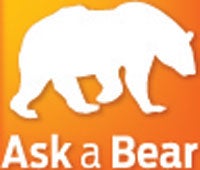Ask A Bear: Do Bear Bells Really Work

'ask a bear'
Q: I visited Yellowstone for the first time this summer, and I wanted to go for a trail run. It was my first time alone in grizzly country, so I decided to buy some bear bells. At the checkout, the lady decided to warn me that because so many people use bear bells now, you might actually associate the sound with humans and come to investigate. You wouldn’t really do that, would you!?—Boomer from Wisconsin, via email

A: Dinner bells, hiker hamburger hail, afternoon-snack alarm—the bear bell is a bear-country souvenir store staple that gets a lot of flack from locals and backcountry veterans. Whether it works on me isn’t exactly clear.
In the most advanced testing, bear biologist Tom Smith jingled bear bells in varying volumes in front of brown bears in Katmai National Park. Regardless of how vigorously he shook, 15 different sets of bruins ignored the bells. And yet they snapped at attention the second he broke a pencil in half. This isn’t 100-percent proof that bears don’t respond to bear bells; Katmai bears are known for being relatively non-aggressive. But it means that in this specific case, the bells failed to warn and change my behavior as intended.
It’s possible that bells aren’t loud or unfamiliar enough; I might be tuning them out the same way I tune out gurgling water or birds chirping. Supporters point out that in a study in Glacier National Park conducted in 1982, the only people who got charged by bears that year were not wearing bells.
As far as attraction, bear guru Stephen Herrero leaves room for the possibility that bear bells might arouse interest in the more curious members of my species. There’s not a lot hard evidence to support this, but when the human ambassador for my kind points it out, you probably should at least consider it.
Regardless, bells aren’t terribly loud and could easily get lost in the sounds of wind, a river, or thick forest. It’s much safer and smarter to use your own voice: Sing, shout my name, or, if you’re Herrero, yodel. It’s the best, most reliable way to alert me to your unfamiliar presence and ensure that I head in the opposite direction. Believe me: Yodeling sounds just as bad to my ears as it does to yours.
—BEAR
Got a question for the bear? Send it to askabear@backpacker.com.